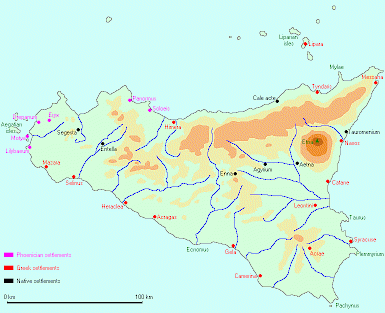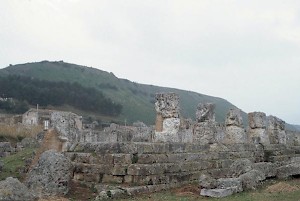Hamilcar (1)
Hamilcar (Punic Abd-Melqart; †480): Carthaginian general, defeated by the Syracusans in the battle of Himera.

Hamilcar was the son of a man named Hanno Sabellus, a Carthaginian general who had conquered parts of northern Africa, and a Greek woman from Syracuse. Hamilcar's brother Hasdrubal was a well-known Carthaginian commander who fought on Sardinia. We know that Hamilcar took part in the Sardinian war, but his exact role is unclear.
In 480, he was commander of an army that was sent out to fight against the Greeks of Sicily. Here, a complex war had broken out. The tyrant of Acragas, Theron, had captured Himera, which meant that he ruled a territory stretching from Sicily's northern to its southern coast. The expelled tyrant of Himera, Terillus, asked help from Anaxilaus of Rhegium, and from his personal friend Hamilcar. Now, the conflict excalated. The size of the Carthaginian army suggests that the Carthaginians wanted to advance to other cities, like Acragas and Syracuse, after they had liberated Himera. If this had happened, Sicily would have been united for the first time in history.
The oldest story of the battle of Himera is told by the Greek researcher Herodotus of Halicarnassus. The Carthaginian commander built up a large army and navy in the far west of Sicily and started to besiege Himera. Theron, however, held out and Gelon was able to defeat the Carthaginians decisively, probably (but this is not told by Herodotus) because Hamilcar, who expected Greek reinforcements, allowed Greek troops to enter his camp, and discovered too late that they were his enemies. Herodotus adds:
Hamilcar remained in the camp and made sacrifices to get good omens of success, offering whole bodies of victims upon a great pyre. When he saw that there was a rout of his own army, he [...] threw himself into the fire, and thus he was burnt up and disappeared. [...] The Carthaginians offer sacrifices to him now, and also they made memorials of him then in all the cities of their colonies, and the greatest in Carthage itself.note
The final part of this statement is probably based on a misunderstanding, because the Carthaginians are not otherwise known as sacrificing to dead heroes. The explanation may be that the name Hamilcar is a Greek rendering of a name like Abd-Melqart ("servant of Melqart"); Herodotus attributes the many temples of Melqart to Hamilcar. The self-sacrifice may have been a devotio.

According to later legend, the victory at Himera, where the western Greeks had been liberated from the Carthaginian threat, took place on the very day of the defeat of the Greeks of the mother country at Thermopylae.
Hamilicar had a son named Gesco, who lived, after his father's defeat, as an exile in Selinus. His son was Hannibal, who successfully waged war against the Greeks in 410-405. At Himera, he tortured three thousand of them and sacrificed them to his grandfather.